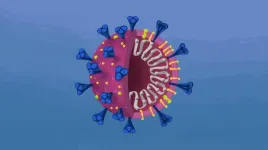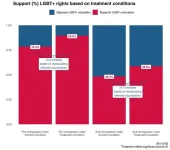When inflammation occurs in the body a host of proteins are released into the blood called cytokines. Previous research has shown that higher levels of cytokines are associated with depression in adults, but little is known about this relationship in adolescence.
Researchers investigated sex-differences in the relationship between inflammatory proteins and depression. Published in the Journal of Affective Disorders, the study found that different cytokines were implicated in depression risk and severity in boys compared to girls. The research was part of the IDEA (Identifying Depression Early in Adolescence) project funded by MQ Mental Health Research.
To assess inflammation, researchers measured the blood cytokine levels in 75 adolescent boys and 75 adolescent girls (aged 14-16 years) from Brazil. The 150 participants had been recruited into three groups with equal numbers (50 participants in each group: 25 girls and 25 boys). The groups were those at low-risk for depression and not depressed, those at high risk of depression and not depressed, and those currently experiencing major depressive disorder (MDD).
The findings indicated that there are sex differences between the individual inflammatory proteins that are associated with depression in adolescents. Higher levels of the cytokine interleukin-2 (IL-2) were associated with both increased risk for depression and the severity of depressive symptoms in boys, but not in girls. However, higher levels of IL-6 were associated with severity of depression in girls, but not boys. In boys the levels of IL-2 were higher in the high-risk than the low-risk group and even higher in the group diagnosed with depression, indicating that in boys IL-2 levels in the blood could help indicate the onset of future depression.
Dr Zuzanna Zajkowska, Postdoctoral Researcher at King’s IoPPN and first author of the study, said,
“This is the first study to show differences between boys and girls in the patterns of inflammation that are linked to the risk and development of adolescent depression. We found that the severity of depressive symptoms was associated with increased levels of the cytokine interleukin-2 in boys, but interleukin-6 in girls. We know more adolescent girls develop depression than boys and that the disorder takes a different course depending on sex so we hope that our findings will enable us to better understand why there are these differences and ultimately help develop more targeted treatments for different biological sexes.”
Researchers recruited adolescents from public schools in Brazil. Risk of depression was assessed by a composite risk score for depression based on 11 sociodemographic variables that had been developed as part of the IDEA project. Adolescents completed several questionnaires, self-reporting their emotional difficulties, relationships, experiences, and mood. They also completed a clinical assessment with a child and adolescent psychiatrist.
Senior author on the study Professor Valeria Mondelli, Clinical Professor of Psychoneuroimmunology at King’s IoPPN and theme-lead for Psychosis and Mood Disorders at the NIHR Maudsley BRC, said,
“Our findings suggest that inflammation and biological sex may have combined contribution to the risk for depression. We know that adolescence is a key time when many mental disorders first develop and by identifying which inflammatory proteins are linked to depression and how this is different between boys and girls we hope that our findings can pave the way to understanding what happens at this critical time in life. Our research highlights the importance of considering the combined impact of biology, psychology, and social factors to understand the mechanisms underlying depression.”
The study is part of the Identifying Depression Early in Adolescence (IDEA) project, led by Professor Valeria Mondelli at King’s IoPPN and funded by MQ Mental Health Research. The IDEA project is investigating how cultural, social, genetic and environmental factors lead to the development of depression in 10–24-year-olds across the UK, Brazil, Nigeria, Nepal, New Zealand and USA.
The study received support from the charity MQ Mental Health Research, UK Medical Research Council and the Academy of Medical Sciences. Professor Valeria Mondelli is supported by the National Institute for Health and Care Research (NIHR) Maudsley Biomedical Research Centre at South London and Maudsley NHS Foundation Trust and King’s College London and the Medical Research Council.
ENDS
Under strict embargo until 13 September 2023 12.30 pm UK time
‘Sex-specific inflammatory markers of risk and presence of depression in adolescents’ (Zuzanna Zajkowska, Naghmeh Nikkheslat, Pedro H. Manfro, Laila Souza, Fernanda Rohrsetzer, Anna Viduani, Rivka Pereira, Jader Piccin, Valentina Zonca, Annabel E. L. Walsh, Nancy Gullett, Helen L. Fisher, Johnna R. Swartz, Brandon A. Kohrt, Christian Kieling, Valeria Mondelli) was published in the Journal of Affective Disorders .
After the embargo lifts the paper will be available online: https://www.sciencedirect.com/science/article/pii/S016503272300890X
For more information and to receive an embargoed copy of the paper please contact:
Franca Davenport, Communications and Engagement Manager (part-time), NIHR Maudsley Biomedical Research Centre, franca.davenport@kcl.ac.uk Tel: ++ 44 (0) 7976 918968
NOTES TO EDITORS
The paper is under strict embargo until Wednesday 13 September 2023 12.30 pm UK time
The labels have been added to this press release as part of a project run by the Academy of Medical Sciences seeking to improve the communication of evidence. For more information, please see: http://www.sciencemediacentre.org/wp-content/uploads/2018/01/AMS-press-release-labelling-system-GUIDANCE.pdf
The IDEA risk score (IDEA-RS) was developed based on 11 sociodemographic variables including biological sex, drug use, school failure, social isolation, fight involvement, relationship with mother, relationship with father, relationship between parents, childhood maltreatment, and running away from home, to estimate individual-level probability of developing major depression among Brazilian adolescents. Using this composite risk score at the age of 15, we were able to predict, with good accuracy, which adolescents would develop depression at the age of 18 in adolescents in Brazil. External validation indicated that the IDEA-RS was also able to predict the occurrence of depression in samples from other countries across 6 continents. Further information on the IDEA-RS can be read in this paper: https://www.ncbi.nlm.nih.gov/pmc/articles/PMC8255472/
About King’s College London and the Institute of Psychiatry, Psychology & Neuroscience
King's College London is one of the top 35 universities in the world and one of the top 10 in Europe (QS World University Rankings, 2021/22) and among the oldest in England. King's has more than 33,000 students (including more than 12,800 postgraduates) from over 150 countries worldwide, and 8,500 staff. King's has an outstanding reputation for world-class teaching and cutting-edge research.
The Institute of Psychiatry, Psychology & Neuroscience (IoPPN) at King’s is a leading centre for mental health and neuroscience research in Europe. It produces more highly cited outputs (top 1% citations) on psychiatry and mental health than any other centre (SciVal 2021), and on this metric has risen from 16th (2014) to 4th (2021) in the world for highly cited neuroscience outputs. In the 2021 Research Excellence Framework (REF), 90% of research at the IoPPN was deemed ‘world leading’ or ‘internationally excellent’ (3* and 4*). World-leading research from the IoPPN has made, and continues to make, an impact on how we understand, prevent and treat mental illness, neurological conditions, and other conditions that affect the brain.
www.kcl.ac.uk/ioppn | Follow @KingsIoPPN on Twitter, Instagram, Facebook and LinkedIn
MQ Mental Health Research
MQ is a global charity committed to scientific research into understanding different mental health conditions, developing new interventions and championing prevention of mental illness.
MQ has invested over £24million over the last ten years into research projects all around the world which have led to better understandings and new interventions for serious mental illnesses such as depression, anxiety, psychosis and eating disorders.
www.mqmentalhealth.org
The National Institute for Health and Care Research (NIHR)
The mission of the National Institute for Health and Care Research (NIHR) is to improve the health and wealth of the nation through research. We do this by:
Funding high quality, timely research that benefits the NHS, public health and social care;
Investing in world-class expertise, facilities and a skilled delivery workforce to translate discoveries into improved treatments and services;
Partnering with patients, service users, carers and communities, improving the relevance, quality and impact of our research;
Attracting, training and supporting the best researchers to tackle complex health and social care challenges;
Collaborating with other public funders, charities and industry to help shape a cohesive and globally competitive research system;
Funding applied global health research and training to meet the needs of the poorest people in low and middle income countries.
NIHR is funded by the Department of Health and Social Care. Its work in low and middle income countries is principally funded through UK Aid from the UK government.
The Medical Research Council is at the forefront of scientific discovery to improve human health. Founded in 1913 to tackle tuberculosis, the MRC now invests taxpayers’ money in some of the best medical research in the world across every area of health. Thirty-three MRC-funded researchers have won Nobel prizes in a wide range of disciplines, and MRC scientists have been behind such diverse discoveries as vitamins, the structure of DNA and the link between smoking and cancer, as well as achievements such as pioneering the use of randomised controlled trials, the invention of MRI scanning, and the development of a group of antibodies used in the making of some of the most successful drugs ever developed. Today, MRC-funded scientists tackle some of the greatest health problems facing humanity in the 21st century, from the rising tide of chronic diseases associated with ageing to the threats posed by rapidly mutating micro-organisms. www.ukri.org/councils/mrc/
The Academy of Medical Sciences is the independent, expert voice of biomedical and health research in the UK. Our Fellowship comprises the most influential scientists in the UK and worldwide, drawn from the NHS, academia, industry, and the public service. Our mission is to improve the health of people everywhere by creating an open and progressive research sector. We do this by working with patients and the public to influence policy and biomedical practice, strengthening UK biomedical and health research, supporting the next generation of researchers through funding and career development opportunities, and working with partners globally.
www.acmedsci.ac.uk @acmedsci Facebook, LinkedIn, Instagram
END



